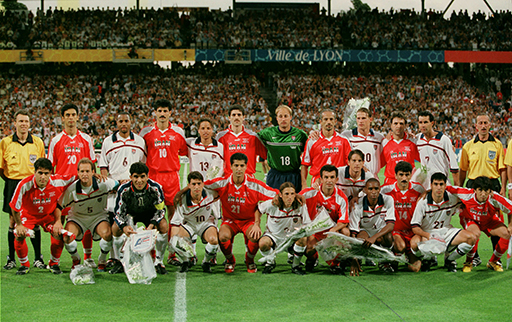4 USA vs Iran: grandiose claims of the most politicised World Cup match?

United States vs Iran (1998 men’s group stage)
The background:
Since the Iranian Revolution (1979), and the subsequent fall of US-backed Shah Mohammed Reza Pahlevi, tensions between the nations had become increasingly hostile. Later in 1979 Iranian militants stormed the US embassy in Tehran, holding over 60 American citizens hostage. The stand-off lasted 444 days and the US severed all diplomatic ties with Iran. ‘The mother of all games’, is how the president of the US Soccer Federation described the moment that USA and Iran were drawn together in the group stage of France 98 (Billingham, 2022). ‘We’re not going to let politics play a part in this’, said then US head coach Steve Sampson in the lead-up to the match (Galarcep, 2018). Iran, on the other hand, were less implicit in their political subtext: ‘We will not lose. Many families of martyrs are expecting us to win’, claimed striker Khodadad Azizi (O’Callaghan, 2018).
The match:
The fixture itself provided FIFA with a potentially red-hot political situation which would necessitate careful handling. One issue required immediate attention. Iran was designated ‘Team B’, meaning that according to FIFA regulations they should walk towards their opponents for the pre-match handshakes, but Iran’s Supreme Leader Khamenei instructed that the Iranian players must not walk towards the Americans, presumably to avoid a perceived symbolic, submissive action to their opponents. Iran went on to secure a 2-1 win, their first victory at a World Cup tournament.
Activity 3 A different kind of ‘political’ match
Watch the video below and answer the two questions:
- How does this fixture differ compared to how people perceive other kinds of ‘political’ matches?
- What political themes might be evident here? (Just in case you forgot, here are the categories: power relations, nationalism and identity, inclusion or segregation, activism, conflict and commercialisation).
Breaking barriers: United States v Iran 1998 [Tip: hold Ctrl and click a link to open it in a new tab. (Hide tip)]
Discussion
- When some people refer to political matches, the description often signifies how politics causes heightened tension between nations competing in sporting events. Yet, despite pre-match concerns, football brought the two countries together on this occasion. Players showcased gestures of respect, standing shoulder to shoulder before kick-off. Iran presented the US with a bouquet of white flowers as a symbol of peace. Displays of sportsmanship showed players, staff and spectators how much they had in common and how the game of football bonded them together. After the game, US’s Jeff Agoos remarked ‘We did more in 90 minutes than the politicians did in 20 years’ (O’Callaghan, 2018).
- While previous tensions instigated a rivalry between the nations, it could be suggested that themes of power relations and nationalism were present here – certainly from the Iranian officials who didn’t want to be seen as inferior to their American counterparts.
The aftermath:
Eighteen months later the two teams played each other again in a friendly in California. Iranian-born Mehrdad Masoudi, FIFA’s media officer for the match, suggested that the friendly would not have taken place had the World Cup fixture not been a success (Billingham, 2022). Nonetheless, tensions between the two nations re-emerged in the aftermath of the 9/11 terrorist attack.
When drawn together in the group stage of the 2022 men’s World Cup, both national team coaches sidestepped the political resonance, saying they were focused on the tournament and its ability to bring people together (Harris, 2022).
